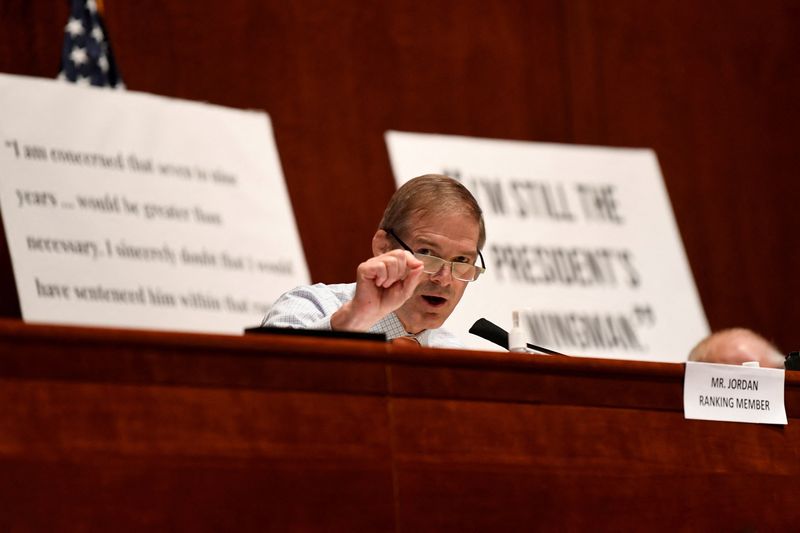By Isla Binnie
(Reuters) -The Republican majority in a U.S. congressional committee published a report on Tuesday accusing Wall Street firms of colluding with advocacy groups to force companies to shrink their greenhouse gas emissions.
The committee's report, which was reported earlier by Reuters, is the first since it launched an investigation in 2022 into whether corporate efforts to tackle climate change violate antitrust laws.
Several Republican-controlled states have been targeting Wall Street firms for entering into climate coalitions and marketing environmental, social and corporate governance (ESG)-focused investment products, fretting that these initiatives will harm jobs in the fossil fuel industry.
This is despite the world failing to live up to an intergovernmental agreement reached in Paris in 2015 to keep global warming to 1.5 degrees Celsius (2.7 degrees Fahrenheit) so it can avoid the most catastrophic effects of climate change.
In the report, Republican lawmakers accuse President Joe Biden's administration of failing to "meaningfully investigate the climate cartel's collusion, let alone bring enforcement actions against its apparent violations of longstanding U.S. antitrust law."
A White House spokesperson did not immediately respond to a request for comment. Congressman Jerrold Nadler, a Democrat who sits on the judiciary committee of the House of Representatives that produced the report, dismissed its findings in a document seen by Reuters.
"There is no theory of antitrust law that prevents private investors from working together to capture the risks associated with climate change," Nadler wrote in the preface to a document prepared by Democrats in response.
While anti-ESG legislation is unlikely as long as Democrats control the White House and the Senate, any recommendation the committee comes up with may shed light on what a new administration led by Republican Donald Trump could try to implement if he prevails in November's U.S. election.
"The goal of any investigation is to inform legislative reforms," a spokesperson for Judiciary Committee chair Jim Jordan said.
No antitrust lawsuit has been brought against any climate coalition of companies. The spokesperson for Jordan declined to comment on any interactions with U.S. antitrust regulators regarding the report. The U.S. Department of Justice and the Federal Trade Commission, which oversee antitrust reviews, did not immediately respond to requests for comment.
The committee's report said it provided interim findings and that the investigation is continuing. The Democrats argued in their rebuttal that co-ordination on climate efforts advances competition by creating a common emissions disclosure framework for asset managers to operate with fewer compliance costs, and for their clients to better compare their performance.
The committee has issued subpoenas for documents and interviewed former regulators. The Republicans focused much of the committee's report on Climate Action 100+, a grouping of more than 700 investors focused on getting companies to curb emissions. They credited their investigation for several asset managers ending their membership this year for fear of an antitrust crackdown.
The committee's report said Climate Action 100+ "bullies asset managers to join" and presses them to use their shareholder votes in support of climate proposals, seeking to reduce fossil fuel extraction and raising energy prices for U.S. consumers.
A spokesperson for Climate Action 100+ said its aims to undertake investor stewardship on climate change were misunderstood in the political discourse, and that its investors were "independent fiduciaries, responsible for their individual investment and voting decisions."
"As the world's largest investor-led engagement initiative, Climate Action 100+ will be scrutinized ... But any scrutiny must be fair, accurate, and based on facts," the spokesperson said.
CALPERS, CERES
Also in the Republicans' cross-hairs were Climate Action 100+ co-founders, the California Public Employees Retirement System (CalPERS) and climate-focused investor group Ceres for their key support of Climate Action 100+. It says activist investor Arjuna Capital, a member, "seeks to destroy fossil fuel companies."
The committee has called witnesses including Ceres president Mindy Lubber to appear at a public hearing on June 12.
Ceres said in a statement that the hearing is part of a larger political campaign to ban investors from considering climate-related financial risk.
A CalPERS spokesperson said it was proud to participate in initiatives like Climate Action 100+. "This is not collusion; it is collaboration," the spokesperson said.
Arjuna did not immediately respond to a request for comment.
The committee's report cited work plans, meeting minutes and other documents the committee obtained, including an internal email referring to a Climate Action 100+ plan to replace board members at oil and gas firm Exxon Mobil (NYSE:XOM), which said this effort would "show (Climate Action 100+) has teeth."

The Republicans described the world's three biggest asset managers, BlackRock (NYSE:BLK), Vanguard and State Street (NYSE:STT), as members of a climate cartel.
Representatives for BlackRock and State Street did not immediately provide comment. A Vanguard spokesperson said the firm's "mission is to help individual investors achieve their financial goals" and it remained committed to cooperating with the committee's requests.